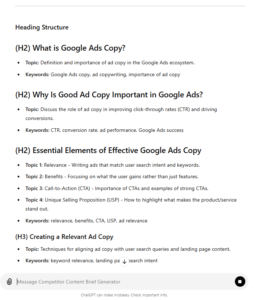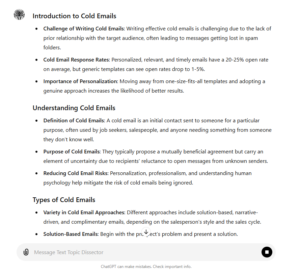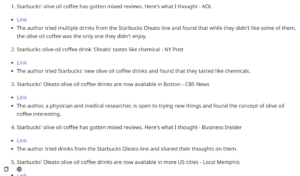Affiliate sites have been hit the hardest by 2023’s Google Algorithm updates.
From what I’ve seen in the field, many sites that have lost rankings and clicks can be traced back to Google Reviews updates.
In this guide, I’ll show you an easy method to identify if your site was hit by Google Reviews updates, and how to improve your pages using my AI-powered Google Reviews Checker.
This app scans your page and provides specific and actionable recommendations with examples to help you better align your page with what Google is looking for.
After reading this guide, you’ll be able to identify Google Reviews issues and fix them with the help of this handy assessment app.
Try the Google Quality Reviews Checker App:
Try it here: AI Google Quality Revies Checker App
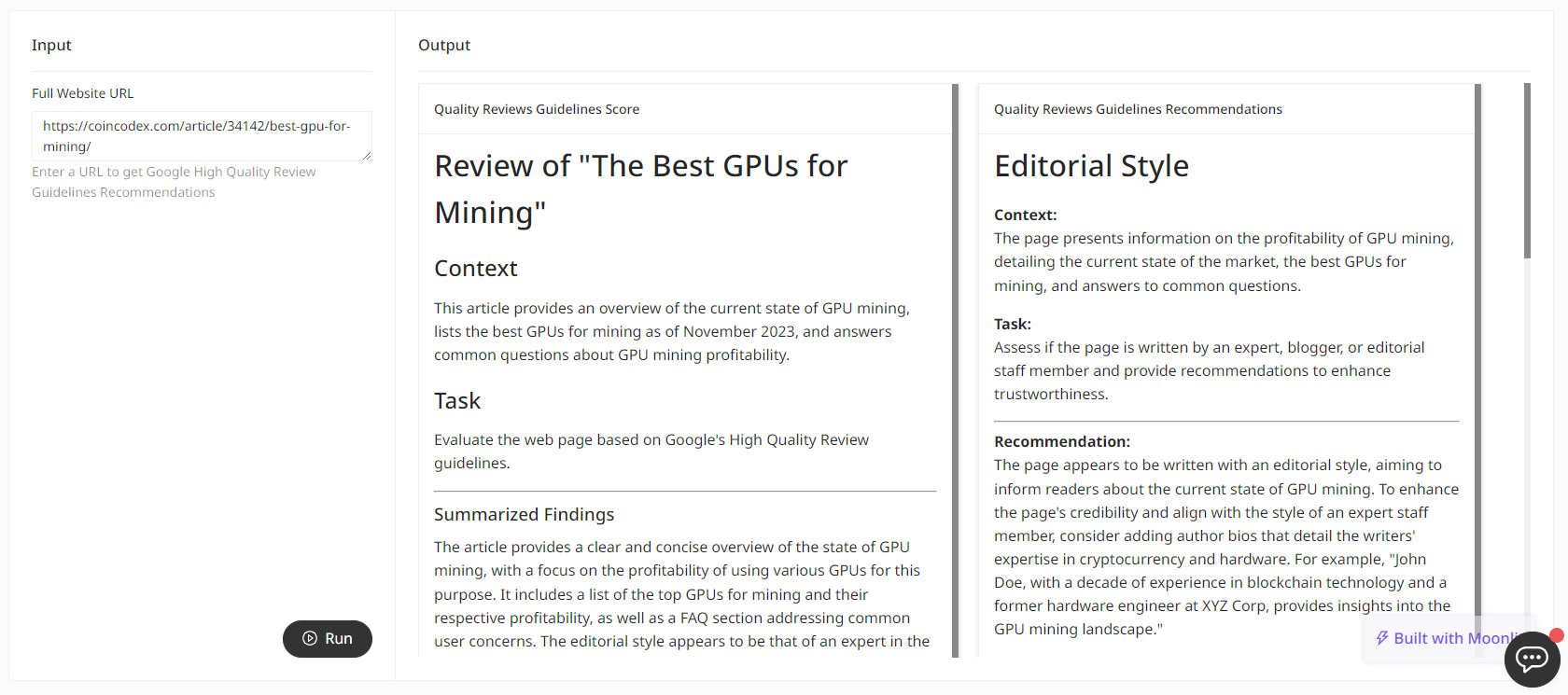
Video walkthrough of the app:
What are Google Reviews updates and why do they matter?
Google Reviews updates were a set of algorithm updates aimed toward pages that recommend or compare products, services, destinations, games, movies, or other topics.
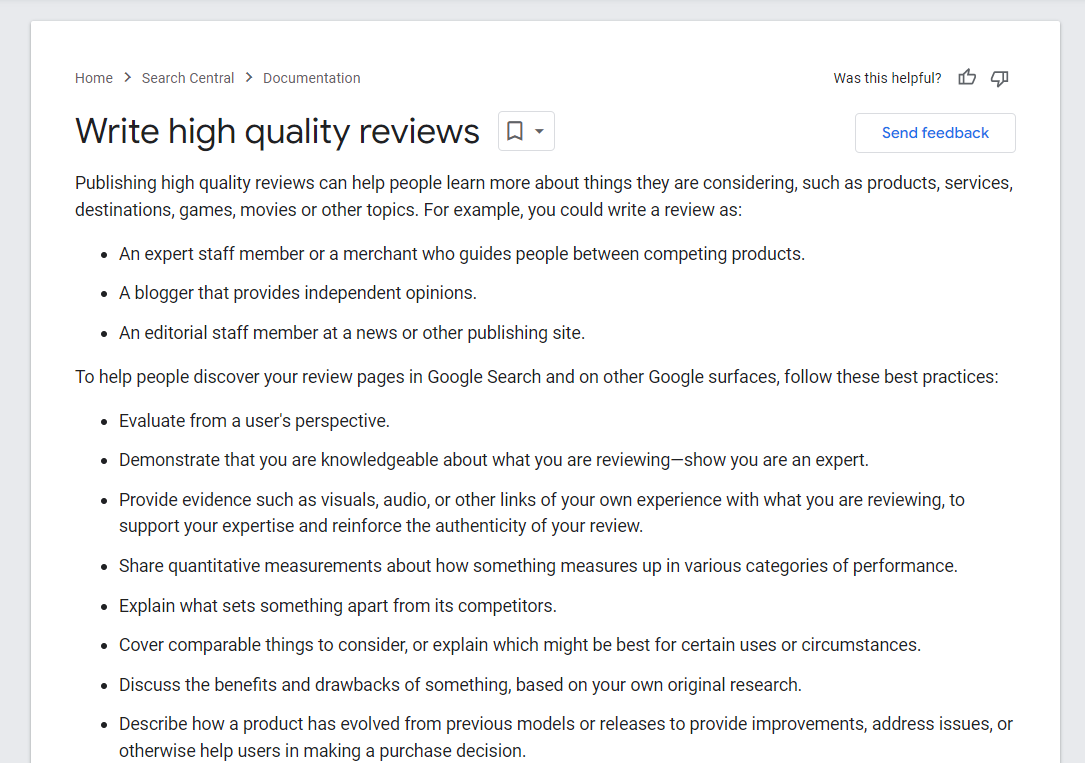
These updates are not strictly about the user-generated reviews for a product on an e-commerce site. The updates can affect any website with “consideration content” aimed towards helping users make a purchase or important decision.
The Google Reviews updates all link to the same guidance article called “Write High-Quality Reviews“. This short page on Google’s help docs covers 15 or so key points to consider to ensure a review is of the highest quality.
Why the Google Reviews updates matter:
From Google’s perspective, they want to rank the most trustworthy consideration articles that help search users make the most informed decisions. That way the top search results will be filled with informative and unbiased opinions from trustworthy sources. It wouldn’t make sense for Google to rank some random article only comparing two products and recommending one of them with limited reasoning.
From an SEO perspective, the Google Reviews updates matter because it’s pretty easy to correlate a decline in rankings, clicks, and impressions immediately or shortly after a Google Reviews update.
The future of Google Reviews updates:
Google released 8 reviews systems updates over the past three years. However, Google will no longer be announcing future Google Reviews updates. Instead, they have decided to keep it vague, and contained within their mysterious “Broad Core Updates” that provide no context as to what was changed within the ranking algorithms.
That means going forward if your site is negatively impacted by reviews updates, it will be much harder to isolate the root cause. It’s safer these days to just follow the High Quality Review guidelines as a precaution.
How to determine if your site was hit by Google Reviews updates
All you will need to tell if your site was impacted by a Google Reviews update is Google Search Console. I also use a Chrome extension called GSC Guardian, which provides an overlay on the performance charts that show when an algorithm update or indexing issue occurs.
This Chrome Extension makes it easier and faster to determine if an algorithm update impacted you.

In my screenshot above, you can see the last known update before this performance decline was the April 2023 review update. It took a little while for it to take effect, which is normal.
Using the GSC Guardian Chrome extension:
Once you have the GSC Guardian extension installed and activated, go to the performance tab in Google Search Console and review the overlay that the extension provides. Then you can start assessing performance vs algorithm updates.
Another key thing to do is filter your performance view. You’ll want to exclude branded queries with a regex filter. And you can consider looking at certain aspects of your website. For example, if your consideration content is housed on your blog, then filter your view with a URL filter to look at blog pages. You can even drill down into a specific page to see how it was affected by various Google updates.
Checking for Google Reviews updates:
Here’s a list of the latest Google Reviews updates. However, keep in mind that Google stated future Google Reviews updates will not be announced:
- November 2023 reviews update
- April 2023 reviews update
- February 2023 product reviews update
- September 2022 product reviews update
- July 2022 product reviews update
- March 2022 product reviews update
- December 2021 product reviews update
- April 2021 product reviews update
Google has been busy nerfing your money site! That’s a total of 8 updates in 31 months specific to “consideration content”. And in the future, they won’t even tell you if they updated their reviews systems.
Analyzing performance against Google Algorithm updates:
Instead of looking strictly at clicks or CTR in Google Search Console, I find it much more helpful to look at average position and impressions.

These two metrics are much more telling if an algorithm update impacted you. You’ll be able to see notable decreases (or increases) following core updates.
For example, you might notice that your average position dropped after an update, followed by a gradual decline in impressions. Or in this site’s case in the screenshot above, a delayed and dramatic decline in impressions after the April 2023 reviews update.
There was speculation of an unconfirmed algorithm update in May 2023. My theory is that sometimes the unconfirmed updates can be a delayed application of previous algorithm updates. It would be too obvious if everyone’s sites declined at the same time.
What to do if your site was impacted by a Google Reviews update:
If you can determine that your site was indeed impacted on or shortly after one of the known Google Reviews updates, it’s time to improve your consideration content. And you’ll want to use Google’s “Write High Quality Reviews” Guidelines to do so.
This short web document is your only defense against 8 algorithm updates and an unknown amount of future possible reviews systems updates. It doesn’t look that important. In reality, it’s the 15 commandments of review content.
Remember that the Google Reviews updates are not specific to certain types of pages or articles. It’s specific to consideration type content, which ties into “Your Money Your Life” (YMYL). Google has stricter ranking rules for YMYL content. If you have text on a page, even a product category page, that aims to guide the user toward making a decision, you could be impacted by Google Reviews updates.
Thankfully, I’ve built this handy Google Reviews Checker app to help you quickly assess a page and get actionable ideas for improvement.
How to use the Google Quality Review Checker App
This app is impossibly simple to run. It’s built with Moonlit, which is my favorite no-code AI builder.
Simply enter the URL of the page you want to check and wait a few minutes.
The app will then retrieve knowledge from its built-in knowledgebase, which in this example is a PDF about Google Reviews updates. And then it will scrape your page.
You’ll then see OpenAI nodes going to work. The app uses GPT-4 turbo to provide two outputs.
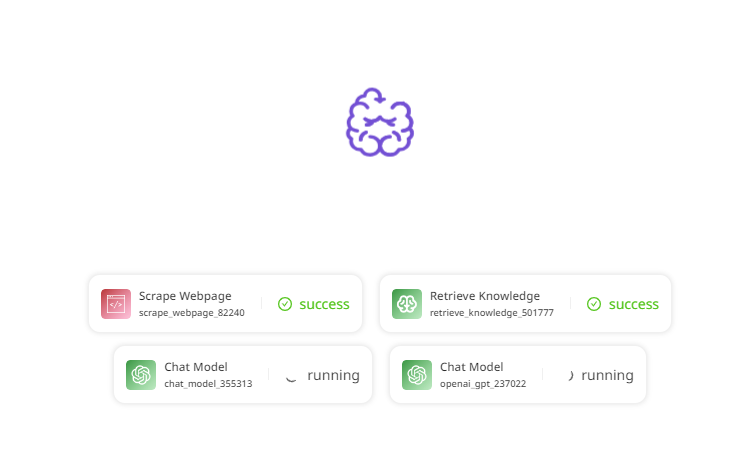
First output: A scoring assessment of your page:
The first output is a scoring assessment that gives your page a score out of 150, based on 15 metrics.
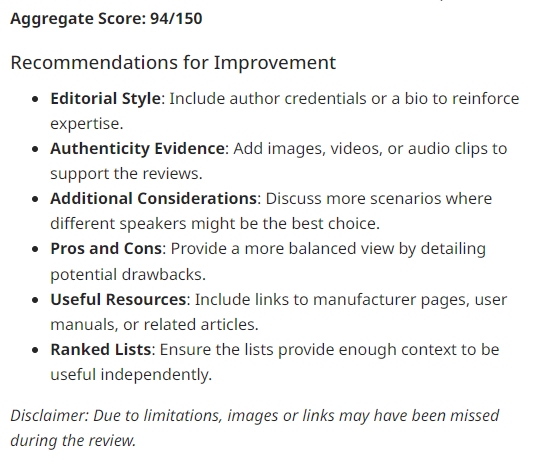
The 15 metrics are the 15 tips within the Write High Quality Review guidelines. ChatGPT will score your page from 0-10 based on how well it thinks your page meets the criteria.
My theory is that Google’s search algorithms can determine if each of the 15 tips provided on the reviews guidelines is found on the page, and to what extent the content meets the recommended criteria. And this may have an impact on rankings. Or at the very least, provides better click and engagement data, which boosts rankings.
Now, this scoring system is not incredibly trustworthy. In my opinion, the AI is too nice and leans toward higher scores. However, it’s useful enough to get a high-level idea of how well the page meets the criteria.
Tip: Try comparing a top-ranking page vs one ranking on the third page. You should see a notably higher reviews score on the top-ranking page.
Second output: Specific and actionable recommendations with examples:
My six favorite words. This app will provide you with ideas and examples of how you could better meet the High Quality Reviews criteria. With some being improvements, and some being opportunities to add new content to your page.
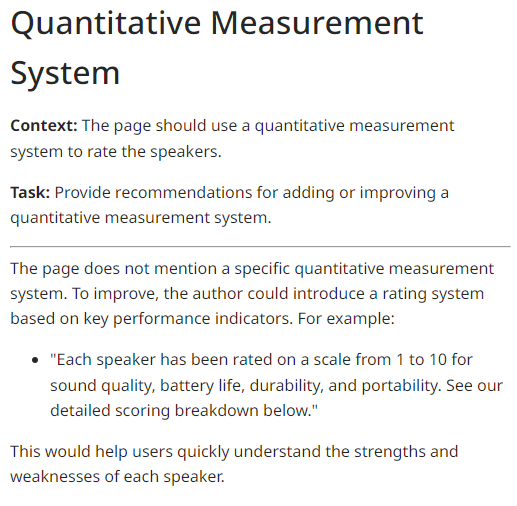
For example, I tested the app on a “best portable speakers” article. One of the recommendations was to add a quantitative measurement system. And provided an example of rating each portable speaker in the article from 1 to 10 based on sound quality, battery life, durability, and portability.
Determining the effectiveness of the Google Quality Review Checker app
You might be thinking, “Ok this is cool but how do I know if doing these things will improve my rankings?”. Which is a great question.
One method would be to incorporate these changes and wait some time to see how they impact rankings. However, I’ll provide some additional outside-the-box ideas to help you immediately validate the effectiveness right now.
Test a top-ranking page and a low-ranking page
These don’t have to be your pages. Simply enter your target query like “Best portable speakers” or whatever you want, and grab the URL of the top-ranking search result.
Then go to page three, or scroll way down, depending on if you are on the new “infinite scroll SERP”, and grab another page. Then run both with the Review Checker App and compare the scoring.
You should find that the top-ranking results have significantly higher scores compared to the low-ranking results.
This is a telltale sign that there is indeed ranking influence behind meeting the High Quality Reviews criteria.
In my example, the top-ranking page scored a 94/150. While a page ranking #25 for the query scored a 51/100.
Test two of your pages, one that ranks well and one that doesn’t
You can perform this same exercise for two of your pages. Find a consideration article that ranks well for its topic on your site. Then find another page that doesn’t and compare the scoring using the Quality Review Checker app.
You should find that your higher-ranking page meets more of the criteria, and gets a higher score.
Example outputs of the Google Quality Review Checker app
Here’s an output for a low-ranking page on the topic “best GPUs for mining”. It provided a nice table with an aggregate score at the bottom of 89/150.
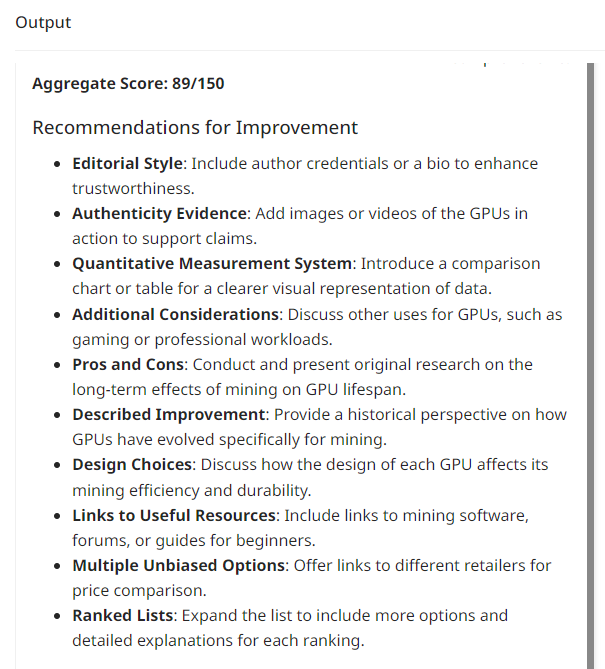
I recommend copying this output and moving it to a Google Doc or similar for easier reading.
The second output provides findings and recommendations for each of the 15 tips.
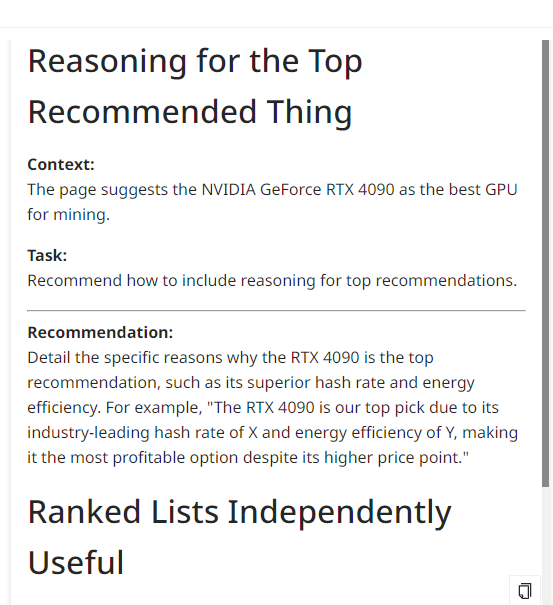
Some highlighted recommendations from the app for this article:
- Adding an expert byline
- Adding case studies or testimonials
- Using a quantitative measurement system like a calculator tool
- Alternative uses like gaming, adding unique research on GPU degradation over time
- Considering other factors like durability, design choices like advanced cooling systems and their benefits
- And more!
It provides a plethora of specific and actionable recommendations with examples – my six favorite words. 😉
Pitfalls of the Google Quality Review Checker app
This app is not perfect, it’s experimental. There are a few known issues to take into consideration when using the app.
Token limitations:
Even with GPT-4 turbo, I was not able to crawl the full HTML of most pages without hitting the token limit. As a result, I’m only scanning the main text of the page.
This means that the app cannot scan images or links out of the box. However, if you have your version of the app, you can go into the backend and turn on “scan the full HTML” to get recommendations around images and links more accurately. It will cost significantly more in credit usage but may be important for you.
Scoring is too nice:
As I mentioned earlier, I find that the scoring system is too nice. It’s supposed to give a 0 if your page does not have the specific criteria found, yet I see sometimes it gives a 5 or a 6, even if you have no content reflecting that recommendation. I’ve added rules within the prompt to be a stricter scorer, but AI is currently hard to control when it comes to scoring something out of 10. It often just doesn’t listen, regardless of prompt instructions.
Potential bugs:
There is always a chance you may get an error or just a really strange output when running the app. My advice here is to just re-run it.
If you are consistently getting an error message, you can reach out to Moonlit support. If you find the recommendations are wacky and way off, contact me with the pages you are checking so I can troubleshoot and make improvements to the app.
Pro Tip: Be nice to your SEO and content teams
As fast-paced SEOs and content managers, we may not have thought of these specific ideas or thought they were needed at the time of writing. Including all 15 things, from unique scoring systems to covering specific design choices outside of what the manufacturer states and more is a lot to take into consideration. Every page would have to be super long to cover all 15 things. It’s up to you to determine how valuable each of the 15 recommendations would be to add to your page.
AI is better and faster than hoomans at in-depth content reviews
It’s also hard to review and assess a page against these 15 recommendations. A human might scan the page and say “Yep, this looks good”. Where an AI can provide an in-depth analysis and score of every factor in less than a minute.
These are AI use cases that I love to talk about, where an AI can significantly outperform a seasoned SEO or content person.
Google Reviews Updates get much less attention than HCU and other updates
I also find that the Google Reviews Updates have not gotten nearly enough attention and buzz compared to Google’s Helpful Content Updates. Google released very little support documentation on reviews criteria, literally just one short document with 15 tips.
From my experience, it’s pretty easy to see a performance decline following a known reviews update. It’s more telling than HCU updates which can often just be a gradual decline.
Build your own Quality Review apps
This is the second Google Guideline app I’ve built. My previous one checks a page against quality rater guidelines and helpful content guidelines.
If you’re interested in building your version of this app, join my AI SEO academy. I’ll show you how it was built (without touching any code) and how to make your own or similar app.
You could use the same method to build a brand guideline checker, tone of voice checker, product knowledge checker, etc.
AI is fantastic at assessing pages against specific criteria. It can do it in seconds, saving you countless hours of manual effort.

